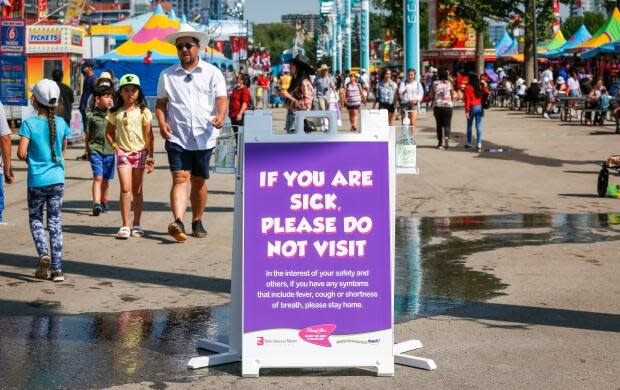At least 71 people caught COVID-19 at Calgary Stampede

The Calgary Stampede says at least 71 people caught COVID-19 during the festival in mid-July.
That's seven cases per day, or a total of 0.01 per cent of 528,998 attendees, the Stampede said.
Dana Peers, the Stampede's interim CEO, said he feels the event — which ran from July 9-18 — was a success despite the on-site transmission.
"We committed to operating safely, and these results show the effectiveness of the enhanced safety measures that were put in place," Peers said in a news release on Tuesday.
The Stampede was being closely watched as one of the first major events to be held in Canada since the beginning of the COVID-19 pandemic.
Festival officials did not respond to a question asking if the more than half a million attendees at the Stampede were unique visitors, or if they had returned to the festival multiple times. If they were return visitors, the percentage of people who caught the virus could potentially be higher.
Nearly all public health restrictions in Alberta were removed as of July 1, a week before the festival began.
For context, Dr. Jia Hu, the Stampede's medical director, pointed out that a total of 749 cases were reported over the past two weeks across Alberta.
He said seeing a "low number of cases" associated with the Calgary Stampede was anticipated.
"The Stampede has gone above and beyond when it comes to safety measures, and events across the country can learn a great deal," said Hu.
The Stampede had a number of health precautions in place, including requiring either proof of vaccination or a rapid COVID-19 test to enter its popular country music venue Nashville North. That tent saw thousands of concertgoers each night.
Other safety measures included cutting daily attendance in half, sanitation stations for the public and enhanced cleaning throughout the grounds. Staff and volunteers were required to wear masks and get rapid tests.
Zero cases were identified among Stampede personnel and rodeo athletes competing at the event, the organization said.
Alberta Health said in a statement that the Stampede "so far does not appear to have been a significant driver of rising COVID-19 cases in the province."
Alberta Health would not say how many of the cases transmitted at Stampede were variant cases, were acquired among vaccinated people, or how many people are isolating or have since tested positive due to these initial 71 cases.
Significant case increases likely, doctor says
However, Dr. James Talbot, a former chief medical officer of health for the province and a public health professor at the University of Alberta, said he wouldn't expect to see many cases associated with the event showing up until August, since it didn't end until July 18.
"We're likely to see significant increases until the end of August," said Talbot. "And with the fuel that the virus feeds on [being] unimmunized people — with 25 per cent of the population over the age of 12 still unimmunized — there's a lot of fuel."
Calgary's current R-value, or the rate at which COVID-19 spreads, is 1.5. That means 1.5 new cases for each person who tests positive — or that those 71 cases could lead to 106 more, and so forth.
Without a greater share of the population vaccinated, Talbot said there's opportunity for more transmissible variants to widely spread.
"The Stampede is popular all across Western Canada. So that surge is likely to happen not just in Calgary. It will happen in the rest of the province and probably across Western Canada," Talbot said.
There are currently 1,173 active COVID-19 cases across Alberta, 725 of which are in the Calgary area. Nearly 41 per cent of active cases in the province currently have no known source of transmission.
Active COVID-19 cases by health zone, over the past 3 weeks

